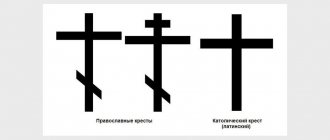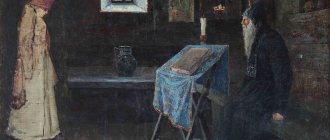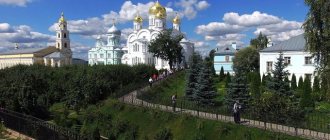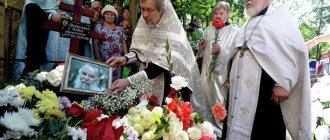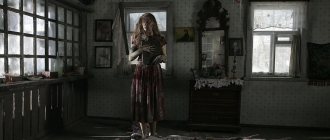Edifying stories from the life of Orthodox Russian archpastors and shepherds
In the old days, when landowners considered themselves masters not only of the peasants, but also of all rural people, not excluding the clergy, clashes between the clergy and the landowners were inevitable and widespread; the consequences of these clashes in most cases were sad for the spiritual, powerless in the fight against the “masters.” Of no small importance in this regard was the personal character of one or another bishop, who inevitably had to be the judge between the combatants. There were wise bishops who were well aware of their direct duty to have, first of all, care and concern for the welfare of their direct subordinates and helpers in shepherding their spiritual flock, and they strictly dealt with fair complaints against the clergy from the nagging and unfair attacks of the bureaucrats and landowners; but there were also quite a few such saints (in the first half of the last century) who, either out of weakness of character or “fear for the sake of the Jews” (most of all they were afraid of the connections of secular people with St. Petersburg) yielded to every complaint and every denunciation and ruined the poor priests with translations from one parish to another. In this regard, in the character of Rev. Smaragd had a remarkable trait that was loved by his subordinates in all the dioceses in which he served: St. Smaragd was strict in his relations with the clergy, exacting and often quick to impose punishments (in these cases, the bishop himself often simply asked for forgiveness from the unjustly offended priest or deacon) but when dealing with disputes between the clergy and landowners and officials, he always adhered to the excellent rule - “ not to betray his own.”
And in general, the Most Reverend Smaragd did not favor the arrogant bureaucracy and the arrogant nobility, and did not value their opinion of himself, and on opportune occasions he abruptly and abruptly cut off anyone who inappropriately interfered in his affairs in managing the diocese. There were many stories about Smaragd on this topic, and some of these stories have long since found their way into print, although only under the guise of “trifles of bishop’s life.” Two incidents from the Kharkov life of Rev. The Emeralds placed below are not significant in themselves, but are characteristic in the sense that they perfectly describe the personality of the late saint.
1) In the Kharkov province at that time lived a rich and noble landowner Bantysh - an old man, a retired general and an ace in the circle of the provincial nobility. During a tour of the diocese, Rev. Smaragd was supposed to visit the estate of Bantysh, who wanted to receive the bishop and treat him to dinner (for which the surrounding nobility were invited) - and, by the way, to complain about “his” priest.
Warned of everything, the Right Reverend arrived at noon at Bantysh’s estate and, of course, first of all, went to the church, where he was met by the priest, the landowner “himself” and the mass of people. The church was old, wooden, and its dilapidated appearance, both outside and inside, made a heavy impression on the bishop. The bishop entered the church, prayed and began to look around. Walks around the church and
repeats only “e-he, he, he!”
(a sign of displeasure). He didn’t say anything else to anyone, blessed the people and headed for the exit. Upon leaving, the landowner invites the Eminence to come to him to relax and eat, to which the latter expresses his consent and himself offers to walk to the landowner’s house, fortunately, the weather was fine and the distance was not very long. On the way, Bantysh shows Smaragda his wealth, and shows off his ability to conduct agriculture: “here is an orchard and a greenhouse, ... here are stone stables, here are the same barnyard and poultry yard ... and here is my home (a large two-story stone house , beautifully set among ancient linden trees).” The Bishop walked and, silently, listened to the landowner, silently, he entered the house, and only at the entrance asked: “Is the local priest here?” but there was no answer to his question, for the village priest was not honored with an invitation to the landowner’s house, much less to the bishop’s dinner. The Eminence was led into a large hall, where the dinner table had been prepared, and where the assembled nobility had gathered. In the middle of the hall, the bishop stopped, silently, began to examine the decorations of the room and the uniforms of the nobles and, as if he had not heard the owner’s repeated invitation to bless the meal and sit down to eat his bread and salt. Suddenly the Reverend Smaragd addresses the owner with the following speech: “everything here is good, even rich... even luxurious... I see only two ruins
here - these are you, Mr. landowner and the Church of God on your estate. I can't eat with you. Farewell!... Order the carriage to arrive.”... The bishop quickly left the house, got into the carriage and set off on his further journey.
The remaining landowner and his guests, of course, were amazed and embarrassed by such an unexpected departure of the Right Reverend; but at dinner they began to heatedly discuss the bishop’s action in various ways and motives. Only when left alone did Bantysh strictly discuss the events of the day and come to the conclusion that he himself needed to correct the matter. Indeed, after a while Bantysh arrives in Kharkov and appears to the Reverend. Smaragda together with the architect and with a rich plan for a stone church on his estate. "I knew it! - Smaragd greets him (with his usual greeting when he wanted to show attention to a visitor), “I knew that you are a good Christian and, as a true Russian nobleman, you will not tolerate the neglect of the Church of God. Well, God bless you! Build a temple, and at the same time pay your attention to the priest: he is a worker, but he is in poverty; help him. “The landowner promised to fulfill this request; then he built a church and became an admirer of Bishop Smaragd.
2) In another place, during the same tour of the diocese, St. Smaragda had to conduct a trial of a village priest on the complaint of two officials.
At that time, forestry was introduced in the south of Russia and, by the way, in the Kharkov province. A forester and his assistant arrived in one village inhabited by state peasants - two young officials of the “first class”, although the eldest of them was already decorated with the Order of St. Stanislaus, 3rd degree. In a village where there were no landowners, young people could find a suitable society for themselves only in the family of a priest; we got acquainted and began to increase our visits to the priest. No matter how difficult it was for the priest to make a new acquaintance, due to his weakness of character, he did not refuse hospitality and almost every day had to receive dear guests and treat them with what God sent. Only the lively mother once took advantage of a major dispute between the owner and the guests, escorted the latter out of the house in broad daylight and closed the doors behind them forever. The officials were offended and brought a complaint against the priest to the dean. O. The dean advised the priest to apologize to the forest rangers, and the priest himself willingly agreed to ask for forgiveness for the insult, and since Mr. The forest rangers did not want to appear to listen to a verbal apology, so they had to write one on paper. But then the village priest, due to his excessive zeal and sincerity, ruined the whole thing. He began his apology with the following title: “Your Highnesses, dear sirs and gentlemen of various orders.”
... Then he frankly stated his offense before the masters and asked for their forgiveness.
The officials received this paper and were completely indignant, seeing in the title a daring mockery of the entire bureaucracy and even of the royal awards. They found out that a bishop was traveling nearby in the diocese, and they went to him to bring a grave accusation against the priest. The Reverend, warned about this by the dean, listened to the complainants, seriously read the paper with the daring title and said: “Good! Come to the city (nearest county). I’ll be there soon, I’ll call the priest and sort out your complaint.” When the Right Reverend arrived in the city, the accused priest was already there and was awaiting trial and decision, but received only an appointment for the next day to participate in the bishop's service in the cathedral. The next day, in the cathedral, the bishop, during his vestments, asks the subdeacon: “Are there gentlemen of different orders here?”
“ Here,” they answer him.
- “Prepare the legguard.” During the small entrance, they bring the accused priest to the bishop and remove his chasuble... The “cavaliers” see this and reason: “oh, now they’re exposing him, now they’ll cut off his hair”... but then they are perplexed - something completely different is happening: the priest is dressed again and serves together with the bishop. A neighbor who understood the matter explained to them that the bishop probably knew this priest had special merits, for he awarded him a legguard (a rarity for rural clergy in those days). Then only g.g. the officials understood the bishop's court and left the church. After the service, according to custom, the Right Reverend was treated to dinner, to which all city and district officials were invited. Entering the house, the bishop again, loudly asks: “Are there gentlemen of different orders here?”
“No,” they answered, they were embarrassed and disappeared first from the church, and then completely from the city.” The Bishop regretted that he did not have time to complete the reconciliation of the young people with the “distinguished priest,” and seasoned the public dinner with salt ... his conversation on the topic of how various ranks often oppress and destroy priests with trifles and nagging, but the poor clergy does not dare and does not knows where to look for the truth.
The same eyewitness narrator retained in his memory another conversation between Smaragd and his guests, characterizing his views on his brethren - the bishops.
Rumors about the ill condition of Metropolitan Seraphim of St. Petersburg, and even about his intention to retire, began to penetrate the provinces and of course reached Kharkov. Of course, along with these rumors, various assumptions were also spread about who would take the place of the one who had retired: at that time, Archbishop of Warsaw Anthony (Rafalsky) received special attention in St. Petersburg, and therefore they pointed to him as the future metropolitan. On one highly solemn day, in the living room of the Right Reverend Smaragd they were talking precisely on this topic, about new rumors from St. Petersburg. Vladyka listened to the conversation and inserted the following remark: “Yes, that means I won’t be with you for long in Kharkov. Varshavsky will take precedence - I will be sent somewhere to Siberia!” - “Why is this, sir?” - “But this is my “ godson”!
The Bishop did not explain the term he used, but many guessed that the word godson was used precisely in the popular sense in which they call someone punished or disgraced, or generally taught a lesson. Afterwards, one of those present at this meeting explained the riddle, telling the story of Smaragd’s first acquaintance with Anthony. Rev. Smaragd, when he was still an archimandrite - inspector of the Kyiv Academy, was sent to audit the Volyn Seminary, which was, as now, located in the district city of Kremenets, near the Pochaev Lavra. Smaragd found the educational part of the seminary to be good, but economically it made a heavy impression on him, and at first, having visited the Bursat canteen and tasted the food, he, in his natural harshness, uttered the following judgment: “the seminarians are starving, and the economist, seems very full,” and at the same time pointed to Fr.’s stomach with his cane. economy. This housekeeper was none other than the widowed priest Rafalsky, who later reached high ranks. In the 30s, when a commission was sent from St. Petersburg to receive the Pochaev Lavra from the Basilians, among the local members of this commission was a seminary economist, who really provided important services to the cause, as a local resident who knew the Lavra very well (he interfered with the previous owners of the Lavra to hide or take away the monastic wealth). As a reward for these services, priest Rafalsky was offered the management of the same Pochaev Lavra, as governor and in the rank of archimandrite (1833). A year later, Anthony was elevated to bishop, vicar of Warsaw. His new merits in managing the diocese and especially in the matter of reunifying the Uniates drew the attention of Emperor Nicholas to him, who, after visiting Warsaw and personally meeting Anthony, in 1840 ordered the establishment of a special Warsaw diocese, and Anthony to be elevated to the rank of archbishop. Subsequently, also at the request of the sovereign, Anthony actually became Metropolitan of St. Petersburg, after the death of Seraphim (1843), but Smaragd’s prediction came true much earlier than this incident: he was transferred from Kharkov to Astrakhan under Metropolitan Seraphim, and under Anthony he was transferred from Astrakhan to Orel . (“Strand.” 1888 Volume I).
New clothes for Buryat boys
Photo Funky Shapes
Saint Innocent of Irkutsk became the first Orthodox bishop of Eastern Siberia. And although he came from a noble family, he loved to do everything with his own hands. He could spend hours tinkering in the garden, and when he lived in a monastery, he helped pull nets for fishermen. But the bishop considered the education of the local people to be one of his most important affairs. He organized a school for Buryat children, where children learned to read and write and the Law of God. But with the onset of winter, several children suddenly stopped attending classes. It turned out that the children simply had nothing to wear: they did not have winter shoes, and the road to school, even from the nearest villages, was not close. Having learned about this, Bishop Innocent went to a merchant's shop, sold his fishing nets, which he himself had woven, and one icon he had painted. With the proceeds, he bought several meters of leather and thick quilted felt for thirty pairs of gutuls - felt boots. For seven nights he sewed shoes for poor Buryat boys with a thick needle that looked like a hook. A week later the new thing was ready. Bishop Innokenty distributed brand new gutuls to the happy children, and they began going to school again.
We won together
Photo by SlinkyDragon
Once, at a competition for athletes with disabilities, nine participants in the 100-meter race entered the distance. After the starting signal, everyone ran, not at the same speed, but with the same desire to show their best result, finish the distance and win. All except one young man, who immediately tripped, fell on the path and began to cry. The remaining eight participants heard the crying, without saying a word, turned around and went to the fallen man. One girl with Down syndrome helped the young man up, kissed him and said: “Everything will heal soon.” The nine of them, holding hands, crossed the finish line. The entire stadium gave them a standing ovation.
Merry brethren
Photo: spda/www.flickr.com
Once, a hunter, traveling through the desert in search of prey, met a group of monks who were working on collecting firewood for the monastery. The Monk Anthony the Great was with them. He told the brothers something funny, and everyone laughed. The hunter approached the monks and asked him: “How are you, holy father, telling something funny to the brethren, while monks, as you know, are supposed to be dispassionate?” The monk smiled and replied: “Here you have a bow. Pull it,” and the hunter pulled the bowstring. “Stronger,” said Abba Anthony. The hunter pulled harder. "Even stronger!" - “You can’t get any stronger, the bowstring will burst.” - “So is the soul of a monk. If you tighten it too much, it may not withstand the tension and fall. By cheering the brethren, I give rest to their souls, and they gather strength to accomplish new feats for the sake of the Lord.” The hunter liked the explanation, and he, thanking the saint, went to continue his hunt.
How Elder Ambrose rescued turkeys
Photo by Base Camp Baker
Elder Ambrose of Optinsky was once stopped by a woman who had been hired by a landowner to look after her turkeys, but for some reason her turkeys were dying, and the landlady already wanted to pay her off. “Father,” she turned to the elder with tears, “I have no strength; I can’t finish eating them myself, I’m closer than my eyes, but they prick. The lady wants to drive me away. Have pity on me, darling." Those present began to laugh at her and reproach her for bothering the elder with such nonsense. But the Monk Ambrose did not pay attention to these ridicule and questioned her for a long time about what she fed them and how she kept them. Finally, he gave her detailed advice on how to maintain them differently, blessed her and said a warm goodbye. Then he turned to those who laughed at her and said that her whole life was in these turkeys. And from that time on, this woman’s turkeys stopped getting sick.
The story is funny
"Incomprehensible" square
This story is known to many; one might say that it “fits” into the history of the baptismal church - in the “Curious Things” section. It is really funny and does not contain a single word added “for fun” - just a sketch from life.
The attraction of the baptismal chapel is a certain square on its western wall (in fact, it is a rectangle, but it just so happens that we call it a square). The rest of the wall surface is beautifully painted, but it is separated by a frame and is simply empty. It is empty and not decorated, because it symbolizes the habitat of Satan. When renouncing Satan (there is such a moment before the Sacrament of Baptism), they symbolically blow and spit on him.
This is where the funny episode comes from. A guest from Holland arrived at the cathedral. He walks around the cathedral with an interpreter; Hierodeacon Paisius conducts the tour. The guest expresses admiration for our beautiful baptismal chapel. Father Paisius explains the plot of the paintings: here is Saul, the future Apostle Paul, guarding the clothes of those who stone the Apostle Stephen; This is the calling of the Lord for Saul; Saul went blind, but he was baptized and received his sight... The guest is interested in the square. “This square in the west symbolizes the habitat of Satan,” Father Paisiy explains without any ideological background and, turning to face this very west, continues: “This is where we blow and spit.” The Dutch guest freezes in place and suddenly very excitedly and quickly begins to speak in broken Russian (before this, communication took place exclusively through an interpreter): “Now I understand why we, the Dutch, live poorly - we live in the West, and you spit there! !!” This was expressed very emotionally and completely seriously. Father Paisiy turned his face to the east and answered with dignity: “Forgive me, but we cannot spit on the east, the Lord is there.”
"Trinity leaf"


